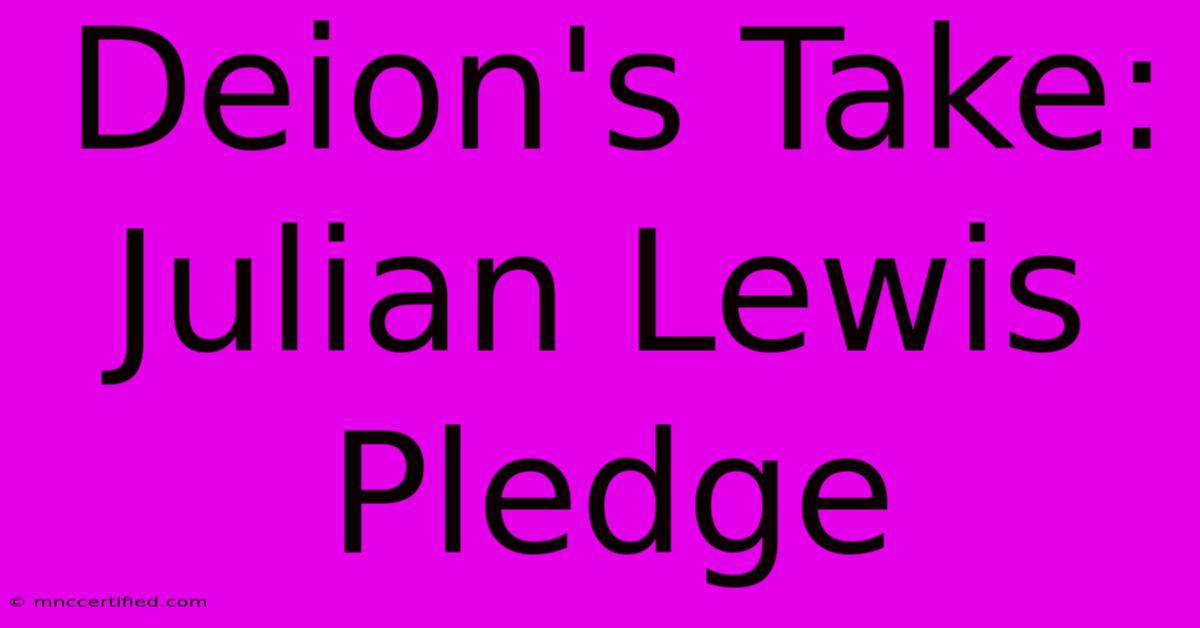Deion's Take: Julian Lewis Pledge

Table of Contents
Deion's Take: A Deep Dive into the Julian Lewis Pledge and its Implications
The Julian Lewis Pledge, a controversial commitment within the British Conservative Party, has ignited intense debate. This article will dissect the pledge, exploring its origins, implications, and the ongoing controversy surrounding it. We'll also examine the perspectives of prominent figures, including Deion Sanders' (though it's important to note upfront that Deion Sanders' direct involvement in this specific political pledge is unlikely). Instead, we'll analyze the pledge through a lens of political strategy, impact, and potential consequences.
Understanding the Julian Lewis Pledge: A Conservative Commitment
The Julian Lewis Pledge is essentially a commitment by Conservative Party MPs to oppose any future treaty or agreement that would cede sovereignty to a supranational body like the European Union (EU). This pledge, named after Conservative MP Julian Lewis, directly challenges the potential for future EU integration or significant compromises in national sovereignty.
Key Aspects of the Pledge:
- Sovereignty: The core principle is maintaining British national sovereignty. Supporters argue the pledge safeguards the UK's independence and ability to make its own laws and decisions.
- EU Influence: It directly targets potential future influence or control from the EU, even beyond the existing Brexit agreement.
- Conservative Ideology: The pledge aligns with a particular faction within the Conservative Party emphasizing a strong, independent Britain.
The Controversy Surrounding the Pledge
The pledge has been the subject of considerable debate within the Conservative Party and beyond. Critics argue that:
- It limits flexibility: The rigid nature of the pledge could hinder the UK's ability to negotiate favorable trade deals or international agreements requiring some level of compromise.
- It's divisive: The pledge exacerbates divisions within the Conservative Party, potentially hindering the government's ability to function effectively.
- It's unrealistic: Some argue the pledge is unrealistic and impractical, given the complexities of international relations and diplomacy.
Deion's (Hypothetical) Take: A Strategic Analysis
While Deion Sanders hasn't publicly commented on the Julian Lewis Pledge, we can hypothetically analyze how his perspective – known for its directness and focus on winning – might apply:
Strategic Advantages (Hypothetical Deion Perspective):
- Strong Messaging: The pledge provides a clear, easily understood message resonating with a specific segment of the electorate prioritizing national sovereignty. This aligns with Deion's approach to communication – clear, concise, and impactful.
- Mobilizing Support: The pledge can be used to galvanize support amongst like-minded voters, potentially crucial in close elections. This mirrors Deion's ability to inspire and motivate his teams.
- Defining a Clear Identity: The pledge helps define a distinct identity within the political landscape, attracting voters who share similar values.
Strategic Disadvantages (Hypothetical Deion Perspective):
- Potential for Isolation: A rigid commitment like the pledge could alienate potential allies and limit negotiating options. Deion understands the importance of collaboration and building relationships.
- Lack of Flexibility: The inflexible nature of the pledge might prove detrimental in unforeseen circumstances, preventing the UK from adapting to changing geopolitical situations. Deion is known for his adaptability on the field.
- Public Perception: The pledge's potential for division could damage the party's overall image and public trust. This resonates with Deion's emphasis on positive brand image and public perception.
Conclusion: Navigating the Future of the Julian Lewis Pledge
The Julian Lewis Pledge remains a significant issue within British politics, raising fundamental questions about national sovereignty, international cooperation, and the internal dynamics of the Conservative Party. While Deion Sanders' direct involvement is not a factor, his hypothetical perspective allows us to understand the pledge's strategic implications through a lens of clear communication, calculated risk, and the importance of flexibility. Further analysis and observation will be essential in determining its long-term impact on British politics.
Keywords: Julian Lewis Pledge, Conservative Party, British Politics, Sovereignty, Brexit, EU, International Relations, Political Strategy, Deion Sanders, Hypothetical Analysis, National Independence, Political Debate, Conservative Ideology.

Thank you for visiting our website wich cover about Deion's Take: Julian Lewis Pledge. We hope the information provided has been useful to you. Feel free to contact us if you have any questions or need further assistance. See you next time and dont miss to bookmark.
Featured Posts
-
Fr44 Non Owner Insurance Florida
Nov 22, 2024
-
Lakers Vs Magic Nov 21 3 Insights
Nov 22, 2024
-
E Coli Cases Rise Amid Nationwide Recall
Nov 22, 2024
-
Week 13 Bengals Lb Predicts Steelers Win
Nov 22, 2024
-
Pmhnp Malpractice Insurance Cost
Nov 22, 2024